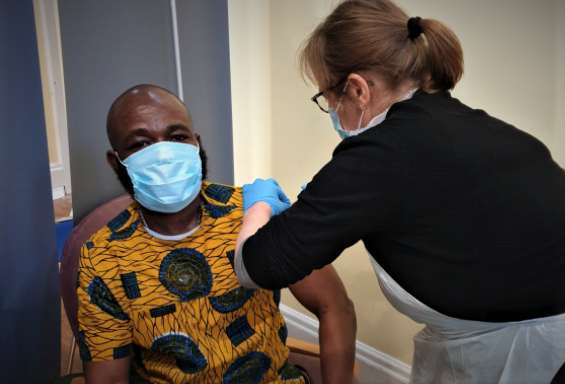
We spoke to Frankie Campbell, a local nurse who works for the NHS. She has been involved with the vaccination programme and has very kindly shared her experience. Have you been vaccinated? Have you volunteered to support local vaccination programmes? Tell us about it!
Tell us about what a typical day vaccinating people looks like? What does the process look like?
I am working in a hospital hub and currently we are vaccinating frontline NHS staff: cleaners, security teams, care assistants, nurses, doctors, psychologists, pharmacists, occupational therapists and social workers.
We are working out of an old sports hall, and the team worked so hard to get the area arranged and fit for purpose as a clinical zone.
We are using the Oxford Astra-Zeneca vaccine which has been great for us, as there is no need to keep it inside a fancy freezer, and you can even keep it at room temperature for a couple of hours.
The Oxford team had luckily already been working on a coronavirus vaccine just before the current pandemic, and so were well able to quickly respond to create the new vaccine.
The vaccine stops at least 70% of people developing Covid symptoms, but most importantly of all, no-one, out of the tens of thousands of volunteers who received the Oxford vaccine in the trials, was hospitalised or became seriously ill due to Covid!
I work with a team of nurses: one of us draws up the vaccine and then the others all check and administer by a small injection into people’s upper arms.
Obviously we have to wear some Personal Protective Equipment (PPE), as we are all assuming that any of us might have Covid without realising, so you get pretty hot and bothered, and I am peering at everyone through my steamed up glasses.
One vial contains several doses, so we only take one out of the fridge at a time, to avoid wasting any vaccine.
At the end of the day, we call up all the wards and departments to find other members of staff to use up any leftover doses as this vaccine is so precious!
We are hoping to be able to roll out the vaccine to more people in the community as soon as we are able. This vaccine roll-out is a real example of how well the NHS can function when we are given the opportunity to manage ourselves.
You must have met a lot of interesting and thankful people when vaccinating?
It is such fun to get together to meet so many lovely colleagues, especially as we have been avoiding face to face meetings unless clinically essential for so long. Sometimes the clinic has felt a bit like a party!
Many people want to have their photo taken getting the vaccine as they realise what a moment in history this is.
Some of our staff are very vulnerable themselves and some have even had to avoid coming into work, so this feels like a real moment of hope for them.
I have had a few members of staff in tears, feeling so relieved that the vaccine is here at last.
Have you been vaccinated yourself?
I had the vaccine myself on the first day I worked in the vaccination clinic, at the end of the shift just in case my arm became sore! My colleague gave me the vaccine, and I honestly didn’t even feel it go in!
We know that once lots of people have been vaccinated it will become so hard for the virus to transmit, and it feels good to be part of that.
I was absolutely fine the next day, but some members of staff have said that they felt a few aches and pains or had a headache. They found that a dose of paracetamol was effective. If you feel a mild reaction, this is a sign that your body has mounted an immune response.
How is morale among you and your NHS colleagues?
Obviously this has been a difficult year for us all, but I think there is a real sense of hope now that we can at last see the light at the end of the tunnel.
Everyone is worried about the impact of social media scare stories, and concerned that people who could be protected by the vaccine will be scared by internet stories.
So if you have had the vaccine, please help out the NHS and talk to your friends, family and colleagues about the importance and safety of vaccination.
